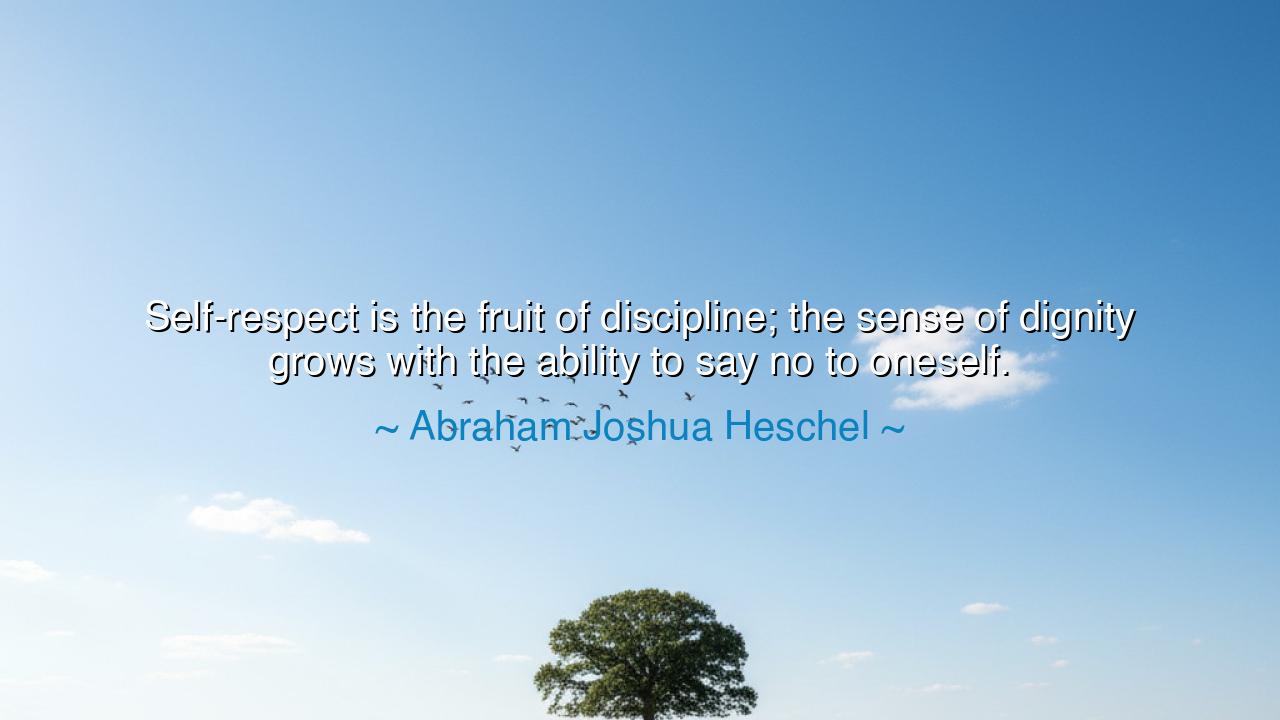
Self-respect is the fruit of discipline; the sense of dignity
Self-respect is the fruit of discipline; the sense of dignity grows with the ability to say no to oneself.






The words of Abraham Joshua Heschel — "Self-respect is the fruit of discipline; the sense of dignity grows with the ability to say no to oneself." — carry the resonance of timeless wisdom. In these words lies a truth both stern and liberating: that the highest self-respect is not granted from without, but cultivated from within. To live without discipline is to be enslaved to desire, tossed like a leaf by every impulse. But to restrain oneself, to say no when appetite beckons falsely, is to rise into true dignity. For dignity is not born of indulgence, but of mastery over one’s own soul.
The origin of this truth rests in the ancient recognition that the greatest victory is not over others, but over oneself. Heschel, a Jewish philosopher and theologian who lived through exile and the terrors of war, understood that the strength of the spirit is forged in restraint. He saw that discipline is the soil from which self-respect blossoms, and that a life ruled by mere impulse cannot bear the weight of honor. To say no to oneself is to guard the sanctity of one’s being, to refuse to betray one’s values for fleeting pleasures.
History offers us noble examples. Consider the life of Mahatma Gandhi, who practiced self-denial not for the sake of suffering, but for the sake of strength. By fasting, by restraining anger, by mastering his own desires, he gained an inner power that no empire could defeat. His self-respect was unshakable because it was not dependent on approval or wealth, but rooted in discipline. From this restraint came the dignity that enabled him to lead millions toward freedom. Without his ability to say no to himself, his vision for his people would have been impossible.
Or look to the example of Epictetus, the Stoic philosopher born into slavery. Though his body was bound, his mind was free, because he practiced discipline. He taught that no man can take from you your freedom if you have mastered your desires and impulses. His self-respect was not diminished by chains, for his dignity came from within. By saying no to resentment, to despair, to indulgence in bitterness, he lived as a free man even in captivity.
Heschel’s words reveal that dignity is not something others can bestow, but something that grows from self-mastery. When you deny yourself what is unworthy, when you resist the temptation of false desires, you stand taller in your own eyes. And that inner strength radiates outward, commanding respect from others. By contrast, the man who yields to every craving is diminished, for he is no master, but a servant to his own weakness.
The lesson is clear: if you would possess true self-respect, you must cultivate discipline. This is not the harshness of denying joy, but the wisdom of choosing rightly. To say no to wasteful indulgence is to say yes to growth. To restrain anger is to protect peace. To reject laziness is to embrace purpose. Each small act of discipline plants the seed of dignity, and from these seeds grows the tree of a life worthy of honor.
What, then, should you do? Begin by practicing small acts of self-mastery. Say no when appetite urges you beyond what is good. Restrain your tongue when anger presses you to speak unwisely. Turn away from distractions that waste the hours of your life. Each denial strengthens the soul, each victory over self raises your spirit higher. In time, you will find that your dignity is no fragile thing, but a fortress unassailable by the winds of circumstance.
Thus let this teaching endure: self-respect is the fruit of discipline, and no other soil can sustain it. If you would walk in dignity, do not seek to conquer nations before you have conquered yourself. For he who commands his own soul is greater than he who commands armies, and he who can say no to himself with wisdom will always walk in honor before heaven and earth.






AAdministratorAdministrator
Welcome, honored guests. Please leave a comment, we will respond soon